Читать книгу Culture and Materialism - Raymond Williams - Страница 17
На сайте Литреса книга снята с продажи.
Base and Superstructure in Marxist Cultural Theory
ОглавлениеAny modern approach to a Marxist theory of culture must begin by considering the proposition of a determining base and a determined superstructure. From a strictly theoretical point of view this is not, in fact, where we might choose to begin. It would be in many ways preferable if we could begin from a proposition which originally was equally central, equally authentic: namely the proposition that social being determines consciousness. It is not that the two propositions necessarily deny each other or are in contradiction. But the proposition of base and superstructure, with its figurative element, with its suggestion of a fixed and definite spatial relationship, constitutes, at least in certain hands, a very specialized and at times unacceptable version of the other proposition. Yet in the transition from Marx to Marxism, and in the development of mainstream Marxism itself, the proposition of the determining base and the determined superstructure has been commonly held to be the key to Marxist cultural analysis.
It is important, as we try to analyse this proposition, to be aware that the term of relationship which is involved, that is to say ‘determines’, is of great linguistic and theoretical complexity. The language of determination and even more of determinism was inherited from idealist and especially theological accounts of the world and man. It is significant that it is in one of his familiar inversions, his contradictions of received propositions, that Marx uses the word which becomes, in English translation, ‘determines’ (the usual but not invariable German word is bestimmen). He is opposing an ideology that had been insistent on the power of certain forces outside man, or, in its secular version, on an abstract determining consciousness. Marx’s own proposition explicitly denies this, and puts the origin of determination in men’s own activities. Nevertheless, the particular history and continuity of the term serves to remind us that there are, within ordinary use—and this is true of most of the major European languages—quite different possible meanings and implications of the word ‘determine’. There is, on the one hand, from its theological inheritance, the notion of an external cause which totally predicts or prefigures, indeed totally controls a subsequent activity. But there is also, from the experience of social practice, a notion of determination as setting limits, exerting pressures.*
Now there is clearly a difference between a process of setting limits and exerting pressures, whether by some external force or by the internal laws of a particular development, and that other process in which a subsequent content is essentially prefigured, predicted and controlled by a pre-existing external force. Yet it is fair to say, looking at many applications of Marxist cultural analysis, that it is the second sense, the notion of prefiguration, prediction or control, which has often explicitly or implicitly been used.
